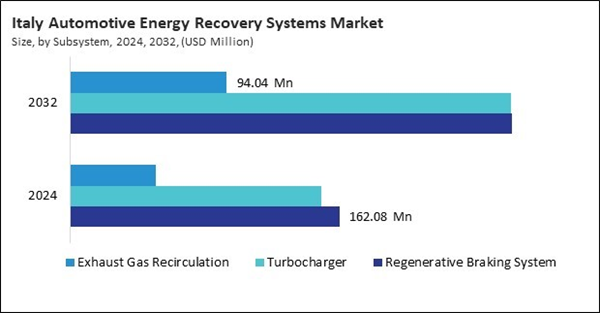The Germany market dominated the Europe Automotive Energy Recovery Systems Market by country in 2024, and is expected to continue to be a dominant market till 2032; thereby, achieving a market value of $2.03 billion by 2032. The UK market is exhibiting a CAGR of 5.1% during 2025-2032. Additionally, the France market is expected to experience a CAGR of 7.3% during 2025-2032.
With the increasing complexity of vehicle systems and the rise of software-defined vehicles, energy recovery systems are now being designed to communicate seamlessly with other vehicle components. This allows for optimized energy management and greater overall vehicle efficiency. Moreover, these systems are increasingly benefiting from advancements in artificial intelligence and machine learning, which help predict energy flow patterns and adapt recovery operations in real time, depending on driving behavior, road conditions, and vehicle load.
The competitive landscape of the automotive energy recovery systems market is characterized by the presence of both long-established automotive giants and emerging technology specialists. Traditional automakers are heavily investing in the research and development of proprietary systems to differentiate their vehicle offerings and comply with tightening global emission norms. Simultaneously, numerous tier-1 and tier-2 component manufacturers are supplying critical modules and working in partnership with vehicle OEMs to co-develop energy recovery technologies.
The European automotive energy recovery systems (ERS) market is experiencing robust growth, driven by stringent environmental regulations and a strong push toward sustainable mobility. The market is projected to grow at a compound annual growth rate (CAGR) of 5.3% from 2023 to 2030, with Germany, France, and the UK leading in adoption. ERS technologies, including regenerative braking, turbocharging, and exhaust gas recirculation (EGR), are increasingly integrated into vehicles to enhance fuel efficiency and reduce emissions. The European Union's commitment to reducing CO₂ emissions and promoting electric vehicles (EVs) is a significant catalyst for this market expansion.
A notable trend in the European ERS market is the emphasis on sustainability and the circular economy. Innovations such as the 'Pioneer' project in Italy, which repurposes used EV batteries for energy storage at Rome's Fiumicino airport, exemplify this shift. Additionally, the integration of vehicle-to-grid (V2G) technology, as seen with Dutch car-sharing firm MyWheels incorporating 500 grid-connectable Renault EVs, highlights the move toward using vehicles as energy assets. These developments align with Europe's broader goals of energy efficiency and renewable energy integration.
The European ERS market is characterized by the presence of established automotive component manufacturers and innovative startups. Key players include Continental AG, Robert Bosch GmbH, ZF Friedrichshafen AG, and Mahle GmbH, all of which are investing in research and development to advance ERS technologies. Emerging companies like Pulsetrain GmbH and Exoès are also contributing to the market with novel solutions in battery management and exhaust heat recovery, respectively. This competitive landscape fosters continuous innovation and collaboration across the industry. Hence, the European ERS market is advancing rapidly, fueled by innovation, sustainability goals, and strong regulatory support for cleaner mobility.
List of Key Companies Profiled
- Robert Bosch GmbH
- Denso Corporation
- Continental AG
- ZF Friedrichshafen AG
- Valeo SA
- Eaton Corporation plc
- Hyundai Motor Company
- Mitsubishi Electric Corporation
- Maxwell Technologies
- Schaeffler AG
Market Report Segmentation
By Propulsion
- ICE
- Electric
By Subsystem
- Regenerative Braking System
- Turbocharger
- Exhaust Gas Recirculation
By Vehicle
- Passenger Cars
- Light Commercial Vehicles
- Heavy Commercial Vehicles
By Country
- Germany
- UK
- France
- Russia
- Spain
- Italy
- Rest of Europe
Table of Contents
Companies Mentioned
- Robert Bosch GmbH
- Denso Corporation
- Continental AG
- ZF Friedrichshafen AG
- Valeo SA
- Eaton Corporation plc
- Hyundai Motor Company
- Mitsubishi Electric Corporation
- Maxwell Technologies
- Schaeffler AG









